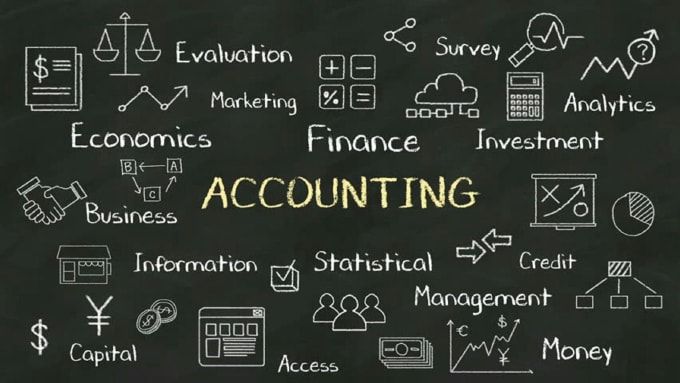The vital role of accountants in business
In today’s fast-paced business environment, accountants play a vital role in ensuring organizations’ financial health and stability. Their expertise goes beyond mere number crunching; they provide critical insights that drive strategic decision-making and sustainable growth. By meticulously analyzing financial data, preparing reports, and ensuring compliance with tax laws, accountants help businesses navigate complex financial landscapes. Understanding the multifaceted role of accountants is essential for leveraging their skills to enhance operational efficiency, manage risks, and achieve long-term business success.

Defining an accountant
An accountant is a professional responsible for managing and analyzing financial records. They are critical in ensuring accurate financial reporting and compliance with laws and regulations. Accountants can specialize in various fields, such as public accounting, management accounting, and internal auditing.
Public accountants provide services like auditing, tax preparation, and consulting to multiple clients. Management accountants work within organizations, focusing on budgeting, performance evaluation, and cost management. Internal auditors assess internal controls and compliance with laws and policies to safeguard the organization’s assets. This diversity in roles highlights the versatility and importance of accountants in different business contexts.
History of accountants and the role in financial stability
The accounting profession began formalizing in 1887 with the creation of the American Association of Public Accountants, leading to the first licensing of Certified Public Accountants (CPAs) in 1896. The Industrial Revolution spurred the profession’s growth as businesses expanded in complexity, and investors sought reliable financial information to gauge business stability and investment risk.
The Great Depression intensified the need for transparency, prompting the establishment of the Securities and Exchange Commission (SEC), which mandated that publicly traded companies submit reports prepared by certified accountants.
Today, accountants continue to be essential in providing accurate financial reporting, supporting economic health, and addressing issues like the unemployment rate by helping maintain financial transparency and trust in markets.
Key roles and responsibilities
Accountants are integral to the financial operations of any business, performing a wide range of tasks:

Recording financial transactions
Accountants ensure that all financial transactions are accurately recorded in the company’s books. For example, they track sales, purchases, and payments to ensure that financial records reflect the actual financial position of the business. This includes managing accounts payable and receivable, which helps maintain accurate cash flow.
Preparing and analyzing financial statements
Accountants prepare essential financial statements such as the balance sheet, income statement, and cash flow statement. These documents provide a snapshot of the company’s financial health. For instance, an income statement shows the company’s revenues and expenses over a specific period, highlighting profitability.
Budgeting and forecasting
Accountants assist in creating budgets and financial forecasts. Analyzing past financial data and market trends helps businesses plan for future expenses and revenues. For example, they might forecast the next quarter’s sales based on historical sales data and current market conditions, aiding in strategic decision-making.

Tax preparation and compliance
Accountants are crucially responsible for ensuring compliance with tax laws. They prepare tax returns and ensure that all tax obligations are met. For instance, they might identify eligible deductions and credits to minimize tax liability, ensuring the business complies with local, state, and federal tax regulations.
Auditing and assurance
Accountants conduct internal and external audits to verify the accuracy of financial records and compliance with regulations. For example, an internal audit might review the company’s internal controls and processes to ensure they are effective and comply with relevant laws and policies.
Advising on business structure and financial strategy
Accountants provide valuable advice on financial planning and business strategies. They might recommend changes in business structure to optimize tax benefits or suggest cost-saving measures. For example, they could advise small businesses to incorporate and take advantage of certain tax benefits and liability protections.
Skills required for accountants
Accountants need a blend of soft and technical skills to excel in their roles.
Soft skills are essential for effective communication and meticulous work.
Good communication skills enable accountants to explain complex financial concepts to non-financial stakeholders, ensuring everyone understands the economic implications of their decisions. For instance, they might need to break down budget variances for department heads. Attention to detail is crucial, as accountants must meticulously review financial documents to identify and correct errors, ensuring the accuracy of financial reporting. Analytical thinking allows accountants to examine financial data critically, identifying trends and insights that can inform strategic business decisions. For example, analyzing sales data can reveal the most profitable product lines, guiding future investments.
Technical skills are also vital for accountants.
A thorough understanding of accounting principles, such as Generally Accepted Accounting Principles (GAAP) or International Financial Reporting Standards (IFRS), is necessary for preparing accurate and compliant financial statements. For instance, correctly applying revenue recognition principles ensures accurate earnings reporting. Proficiency in accounting software, such as QuickBooks, SAP, or Oracle, is essential for managing and automating financial processes, reducing the likelihood of errors and saving time. Finally, economic analysis skills enable accountants to assess a company’s performance by evaluating financial statements and using ratios and metrics to gauge profitability, liquidity, and solvency. This analysis is crucial for making informed strategic decisions that support business growth and stability.
Impact on business operations
Accountants significantly influence business operations by enhancing financial efficiency and supporting strategic growth. They play a crucial role in improving economic efficiency by identifying cost-saving opportunities and streamlining financial processes. For example, through detailed expense analysis, accountants can uncover areas where the business can reduce costs, thereby increasing profitability.
In strategic planning, accountants provide valuable insights through budgeting and forecasting. Analyzing past financial performance and current market trends helps businesses plan for future expenditures and revenues. This forward-looking approach aids in making informed decisions that align with the company’s long-term goals.
Additionally, accountants ensure regulatory compliance and manage risks by keeping up-to-date with changing laws and regulations. They conduct internal audits and implement strong internal controls to prevent financial mismanagement and fraud. For example, a thorough audit can reveal discrepancies that need addressing before they become significant issues.
Finally, accountants offer critical financial reporting and analysis, which supports management in making data-driven decisions. Comprehensive financial reports provide a clear picture of the company’s financial health, helping to evaluate the success of current strategies and plan for future improvements.
Trends in accounting
The accounting field rapidly evolves due to technological advancements and changing business environments.
One significant trend is the rise of automation and accounting software. Tools like QuickBooks and SAP automate routine tasks such as bookkeeping and payroll, allowing accountants to focus on more strategic activities. For instance, automated systems can handle transaction recording and invoicing, reducing errors and increasing efficiency.
Data analytics and real-time reporting are becoming increasingly important as businesses seek to make data-driven decisions. Accountants now use advanced analytical tools to interpret large datasets, providing insights that drive business strategy. Real-time reporting capabilities allow firms to access up-to-date financial information, facilitating quicker and more informed decision-making.
The emphasis on cybersecurity and data privacy is growing, especially with the increased reliance on digital financial systems. Accountants must protect sensitive financial data against breaches and comply with data privacy regulations like GDPR. Implementing robust cybersecurity measures helps preserve the integrity of financial information.
Finally, there is a growing focus on sustainability and integrated reporting. Businesses are increasingly required to report on their environmental and social impact in addition to financial performance. Accountants play a crucial role in developing these integrated reports, providing a holistic view of a company’s overall performance and commitment to sustainable practices.

How to choose the right accountant for your business
Choosing the right accountant is crucial for your business’s financial health and success. Start by identifying your specific business needs and goals. For instance, you’ll need an expert accountant if your business requires complex tax planning or financial audits. Evaluate their qualifications and experience, ensuring they hold relevant certifications such as CPA or CMA.
Consider their industry-specific knowledge, as familiarity with your sector can lead to more tailored advice and strategies. For example, an accountant experienced in retail may better understand inventory management issues than one specializing in real estate.
Assess their communication style and approach. It is essential to choose an accountant who can explain financial matters clearly and is approachable. Effective communication ensures that you understand your financial position and can make informed decisions.
Lastly, look for recommendations and reviews. Speak to other business owners or check online reviews to gauge the accountant’s reliability and performance. This research helps ensure you select a professional who will effectively support your business’s financial management and growth.
Certifications and qualifications
Accountants can hold various certifications that signify their expertise and commitment to the profession. The most common and respected accreditation is the Certified Public Accountant (CPA), which requires rigorous education, examination, and experience standards. CPAs are trusted for their comprehensive knowledge of accounting practices and ethical standards.
Another valuable certification is the Certified Management Accountant (CMA), focusing on financial management and strategic planning. This certification is ideal for accountants who work within businesses and are involved in decision-making.
The Certified Internal Auditor (CIA) certification is essential for those specializing in internal auditing. CIAs are experts in evaluating internal controls, risk management, and governance processes, ensuring organizational compliance and efficiency.
Continuous professional development is crucial for maintaining these certifications and staying updated with accounting standards and regulation changes. Accountants must adhere to legal and ethical standards, ensuring integrity and trust in their financial reporting and advisory roles.
Ethical standards and guiding principles for accountants
Accountants must adhere to ethical standards and guiding principles specific to their region, including frameworks like the International Financial Reporting Standards (IFRS) or Generally Accepted Accounting Principles (GAAP).
IFRS, issued by the International Accounting Standards Board, ensures consistency and transparency in financial statements across different jurisdictions. GAAP, applied within the U.S., sets comprehensive standards for financial reporting by publicly traded companies, helping maintain credibility and trust.
Certified Public Accountants (CPAs) hold a fiduciary responsibility to their clients, requiring them to act with integrity, honesty, and transparency. This responsibility means their actions can significantly impact a company, including its employees, investors, and overall business health.
Accountants may be held accountable under common law for actions such as negligence, misrepresentation, fraud, or breach of contract if they fail to meet the terms of an agreement. Furthermore, under statutory law, state and federal regulatory bodies can impose liabilities if an accountant provides substandard services or inadequate advice.
This regulatory oversight ensures that accountants uphold high standards, protecting both clients and the broader financial community.

The future of accounting in business
The role of accountants is evolving with advancements in technology and changing business landscapes. Accountants increasingly take on advisory and strategic roles, helping businesses navigate complex financial decisions and optimize their operations. Technology, such as artificial intelligence and machine learning, automates routine tasks, allowing accountants to focus on higher-level analysis and strategic planning.
The emphasis on data analytics and real-time reporting transforms how accountants provide insights. With access to real-time data, accountants can offer timely advice that impacts business decisions and performance.
Sustainability reporting is another growing area, with businesses needing to report on their environmental and social impact. Accountants are pivotal in integrating these aspects into financial reports, offering a holistic view of the company’s performance.
Adaptability and continuous learning are essential for accountants to stay relevant. By embracing new technologies and expanding their skill sets, accountants can continue to provide valuable insights and support business growth in a rapidly changing environment.
Takeaway note
Accountants are vital to businesses’ financial success and strategic planning. Their expertise in financial management, compliance, and strategic advisory roles ensures that businesses operate efficiently and make informed decisions. As the accounting profession evolves with technological advancements and new business demands, the role of accountants will continue to expand, offering more value to businesses.
FAQs
What are the main tasks of an accountant?
Accountants record financial transactions, prepare and analyze financial statements, budget and forecast, prepare taxes, ensure compliance, audit, and advise on economic strategy. These tasks ensure accurate financial records, regulatory compliance, and informed business decisions.
What skills are essential for accountants?
Accountants need both soft skills like communication, attention to detail, and analytical thinking and technical skills such as knowledge of accounting principles, proficiency in accounting software, and financial analysis. These skills enable them to manage financial data accurately and provide strategic insights.
How do accountants impact business operations?
Accountants improve financial efficiency by identifying cost-saving opportunities, supporting strategic planning through budgeting and forecasting, ensuring compliance with regulations, and managing risks through audits. They also provide financial analysis that helps in making informed business decisions.
What trends are shaping the accounting profession?
Key trends include automation and accounting software, data analytics and real-time reporting, cybersecurity and data privacy, and sustainability and integrated reporting. These trends are transforming the role of accountants, enabling them to focus more on strategic advisory functions and enhancing business operations.
How can a business choose the right accountant?
To choose the right accountant, businesses should identify their needs, evaluate their qualifications and experience, consider their industry-specific knowledge, and assess their communication style. Recommendations and reviews from other business owners can also help select a reliable and effective accountant.


